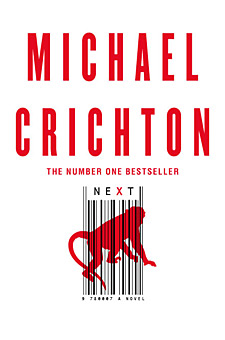Michael Crichton achieved world-wide fame in 1990 with Jurassic Park. Everyone remembers the blockbuster movie, yet the original book focussed not on action, but on the ethics of cloning.
Crichton returns to the biological sciences with his latest book, Next, which explores the legal and moral issues encountered in the world of genetic research.
Next is set in the near future, and most of the technologies it discusses are already viable. The book follows an ensemble of characters, all of whom are affected by genetic research in some way. As the book progresses, the individual story threads become intertwined.
 I’ll mention just a few of the characters. There is the CEO of a biotech company that has found a cure for drug addiction " but bringing the drug to market will require bending a few rules. There is the ordinary man who discovers he no longer has any legal rights to his own DNA. There is the biologist who has to deal with the astonishing results of a highly illegal genetic experiment. And the lawyer, being pursued across the country by a company determined to retrieve tissue samples from her " by force if necessary.
I’ll mention just a few of the characters. There is the CEO of a biotech company that has found a cure for drug addiction " but bringing the drug to market will require bending a few rules. There is the ordinary man who discovers he no longer has any legal rights to his own DNA. There is the biologist who has to deal with the astonishing results of a highly illegal genetic experiment. And the lawyer, being pursued across the country by a company determined to retrieve tissue samples from her " by force if necessary.
Genetic research may not sound like an exciting topic for a novel. There are no dinosaurs running around, but Crichton is an accomplished story teller and Next is a compelling read. It also appears to have been well researched, and Crichton manages to painlessly cram a smorgasbord of technical information into the turning pages. Like the very best science fiction, Next educates while it entertains.
A particular concern of Crichton is the modern practice of "gene patenting', where institutions are granted a patent over a certain sequence of genes. Companies wishing to use these genes in a particular therapy must usually pay a license fee to the patent owner. This can greatly increase the cost of genetic therapies, and it is even possible for a patent owner to block research not in its commercial interest.
Crichton does a good job of exposing the issues. He shows that bio-ethics is broader than just abortion and stem cells. Current practices in genetic research have exposed questions of equity, justice and human dignity, and these must be addressed urgently.
We are very blessed to live in an era when medical technology is able to improve our lives so dramatically. For Christians especially, this privilege carries with it the responsibility of being informed about the ethical issues involved in these treatments. Next explores these issues in an entertaining and intelligent fashion. I recommend it.























